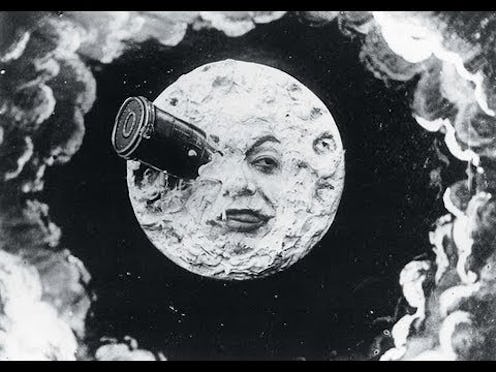Books
7 Sci-Fi Books That Got The Future Very Wrong

Science Fiction has gotten so much right over the years. Sci-fi books have accurately predicted everything from credit cards to earbuds to the internet. But what about the things that science fiction got wrong? I mean, the year 2001 came and went and no evil computers have tried to highjack a mission to Saturn yet. So I think it's safe to say that, every once in a while, Science Fiction can get the future very wrong.
Now, to be fair, very few science fiction authors explicitly set out to predict the future. They set out to write books. Sometimes they set out to write horrifying, apocalyptic futures, to warn humanity that we're heading down a dangerous path. So we can't blame them for getting things wrong here and there. But it's still fascinating to look at what classic sci-fi writers of the past thought the future was going to be. It's 2016, and we don't have any moon hotels to speak of. We don't have widely available personal jetpacks, we haven't met any aliens, and hoverboards are looking pretty lame so far. But we do have tiny pocket computers that we carry everywhere, so I guess it balances out all right.
Here are a few other visions of the future that never quite came to pass:
1. The Roads Must Roll by Robert A. Heinlein: All streets are going to be conveyor belts
On the one hand, Robert A. Heinlein deserves a big shout out for predicting escalators. We do have escalators! We have escalators all over the place! But we don't have conveyor belt sidewalks or highways. Not yet, anyway. The Roads Must Roll predicts a future in which all streets and roads have been replaced by conveyor belts moving at high speeds of 100 m.p.h. I mean... we have those people-movers at the airport, I guess? But we're not quite up to Heinlein's vision yet.
2. The First Men in the Moon by H.G. Wells: The moon is full of bug people
H.G. Wells has a very hit-or-miss track record when it comes to future predictions. He totally knew that we were going to live in a world with tanks and atomic bombs. But when it came to the moon landing... look, let's just say that there's not an advanced society of insects living on the moon (at least, as far as we know). As far as predicting travels to the moon, H.G. Wells' rival Jules Verne probably wins out: he predicted a rocket launch from Florida and a desolate moon with no cool aliens living on it, which is exactly how things went down.
3. 2001: A Space Odyssey by Arthur C. Clarke: Trips to Saturn
Here's a spoiler for you: 2001: A Space Odyssey is a weird book. You're probably thinking that the book can't possible be as weird as the movie, but the two versions of the story were created at the same time, so all bets are off. On the one hand, some of the metaphysical philosophizing is definitely not meant as a literal future prediction. But on the other hand, we're well past the year 2001, and no one's been to Saturn yet (or Jupiter, if you've only seen the movie). And computers are smart these days, but not smart enough to go rogue and murder people (at least, I hope not).
4. Neuromancer by William Gibson: People who live on the internet are super cool
Truly, the greatest lie that science fiction has ever told us is that hackers are super cool dudes. Or that anyone who spends 100% of their time on the internet is roguish and handsome. Neuromancer does a good job of predicted a wacked out future where everyone is addicted to the internet... but people on the internet don't really jump into the "Matrix" and fly around in "cyberspace." There's a lot more sitting around and a lot less wearing sexy jumpsuits.
5. Make Room! Make Room! by Harry Harrison: By 1999, the world will be so crowded that everyone will be vegan
Make Room! Make Room! was the basis for the movie Soylent Green—but minus the cannibalism stuff. So... it's not quite as exciting, but it still predicts the distant future of 1999, when overpopulation will be so bad that people will subsist mainly on soy products. People will literally be overflowing into the streets. The Earth's population will be 7 billion people. Which is... slightly less than the current world population. So Harrison was right about population, but (so far) pretty darn wrong about the subsequent mass veganism.
6. Logan's Run by William F. Nolan: Everyone will die at age 21
Logan's Run is set in 2116, when overpopulation means that it's illegal to be over 21. And 2116 is still a solid 100 years in the future so... who knows! But still, William F. Nolan's introduction to Logan's Run starts us off with the prediction that by the year 2000, the world will be overrun by teens. And it wasn't:
By the early 1970s over 75 percent of the people living on Earth were under 21 years of age. The population continued to climb—and with it the youth percentage.
In the 1980s the figure was 79.7 percent.
In the 1990s, 82.4 percent.
In the year 2000—critical mass.
7. Do Androids Dream of Electric Sheep? by Philip K. Dick: Everyone is a robot
In the post-apocalyptic future of 1992, androids are running rampant. And they are indistinguishable from real humans. We may all carry around robot phones that can talk and give us driving directions, but I think we're a good two or three years off from robots who are utterly identical to human beings. We also don't yet live in a society where owning a sheep in an urban environment is a symbol of wealth. Give that one a couple of years, maybe.
Images: Star Film Company, Giphy (1)